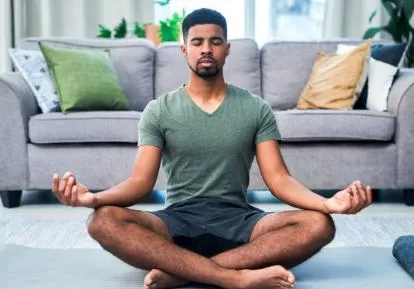How Can I Practice Self-Love While Dealing With Isolation o Loneliness?
Learn how self-love can help you cope with feelings of isolation or solitude.

Selfpause Affirmation App
Download the app to get 1,000’s of affirmation meditations and everything you need to write, record and listen to your own.
It is not difficult to have feelings of alienation and separation from people in the fast-paced world of today, particularly as a result of socially isolating practices and employment arrangements that involve working remotely. The sense of being alone can be difficult and even excruciating at times, but cultivating a healthy relationship with oneself can assist us in navigating these experiences with increased resiliency and compassion. In this piece, we will discuss different approaches to self-love that can be utilized when coping with feelings of solitude or isolation.
Prioritize Self-Care

When it comes to overcoming feelings of isolation, prioritizing one’s own self-care is one of the most crucial components of practicing self-love. Even when things are difficult, if we take care of our bodily and emotional needs, we can make ourselves feel more grounded and have more resilience.
In order to properly care for yourself, you should give activities that are beneficial to your body, mind, and spirit the highest priority. This may involve getting a sufficient amount of sleep, eating nutritious foods, engaging in physical activity, practicing relaxation techniques such as meditation or yoga, or participating in hobbies or artistic endeavors that bring you joy and a sense of fulfillment.
Cultivating Mindfulness
Practicing self-love in the face of isolation or loneliness can benefit greatly from mindfulness, which is another strong skill. Even when we are going through challenging times, we have the ability to build greater self-acceptance and compassion for ourselves by fostering a present-moment awareness along with a non-judgmental attitude.
You can develop the skill of mindfulness by engaging in basic practices like deep breathing and body scanning, both of which can assist you in being more in tune with your body and calming your mind. You might also want to give some thought to participating in activities that are known to foster a sense of connection and presence in the here and now, such as going for a walk in the great outdoors, eating a delectable meal, or listening to music.
Make connections with people.

It is essential to keep in mind that we are all tied to one another and that extending a helping hand to others can be an effective kind of self-love. Isolation and loneliness can have an overpowering effect on a person. There are a lot of ways to connect electronically or over the phone, so even if you can’t be physically there with other people, you can still communicate with them.
If you want to connect with other people, you may try contacting old friends or members of your family who you haven’t talked to in a while, or you could think about becoming a member of an online community or support group that is centered on a subject that interests you. You may also give back to the community by working as a volunteer or getting involved in an organization or cause that shares your beliefs. This can give you a sense of purpose and help you feel more connected to other people.
Exercise Kindness for Yourself
While coping with feelings of isolation or loneliness, another essential component of self-love is to practice self-compassion. Even when confronted with difficult circumstances, we can strengthen our capacity for resilience and improve our ability to regulate our emotions if we practice self-compassion and kindness.
In order to cultivate self-compassion, you should make an effort to tune into your internal dialogue and take note of any negative or self-critical ideas that come to mind. Try to treat yourself with the same compassion and understanding that you would show to a close friend who was going through a difficult time, rather than passing harsh judgment on yourself. You might also try telling yourself reassuring mantras, such as “I am worthy of love and belonging, just as I am,” over and over again.
Embracing Solitude

Although while being alone might be excruciatingly unpleasant, it is essential to keep in mind that being alone can also be an enriching and beneficial experience. We can create a greater sense of self-awareness and connection to ourselves by welcoming moments of isolation, which, in turn, can help us feel more grounded and robust in the face of loneliness.
To become comfortable with being alone, you should strive to schedule time in your day specifically for silent thought. Taking a stroll by yourself, writing in a diary, or even just sitting quietly for a few minutes are all excellent options for this. It is important to keep in mind that isolation is not the same thing as feeling lonely, and that making the conscious decision to spend time alone oneself can help us develop a stronger sense of self-compassion and self-love.
Seek the Assistance of Professionals.
Last but not least, it is essential to acknowledge that experiencing emotions of isolation or loneliness is sometimes an indicator of more significant issues relating to one’s mental health, such as depression or anxiety. It may be beneficial for you to seek professional assistance if you find that the feelings of loneliness or isolation you experience are persistent or are interfering with your day-to-day life.
A mental health professional can provide you with tools and strategies for managing tough emotions, as well as support and counseling as you negotiate the problems of loneliness and isolation. These professionals can also give you with resources and strategies for managing difficult emotions. Seeing a therapist, counselor, or psychologist is one way to get professional assistance; other possibilities include calling a support group or a mental health hotline to get in touch with others who are going through similar experiences.
In conclusion, making an effort to love oneself can be an effective strategy for overcoming the problems posed by feelings of alienation and loneliness. We can learn to develop greater resilience and emotional regulation by making our own self-care a priority, cultivating mindfulness, cultivating connections with others, practicing self-compassion, embracing solitude, and seeking professional help when necessary. This will allow us to learn how to navigate difficult emotions with more compassion and grace. Keep in mind that self-love is not merely an act of indulgence; rather, it is an essential component of our mental and emotional well-being. We can learn to negotiate the problems of life with greater ease and grace if we cultivate love for ourselves, and we can eventually lead happier, more meaningful lives as a result.
